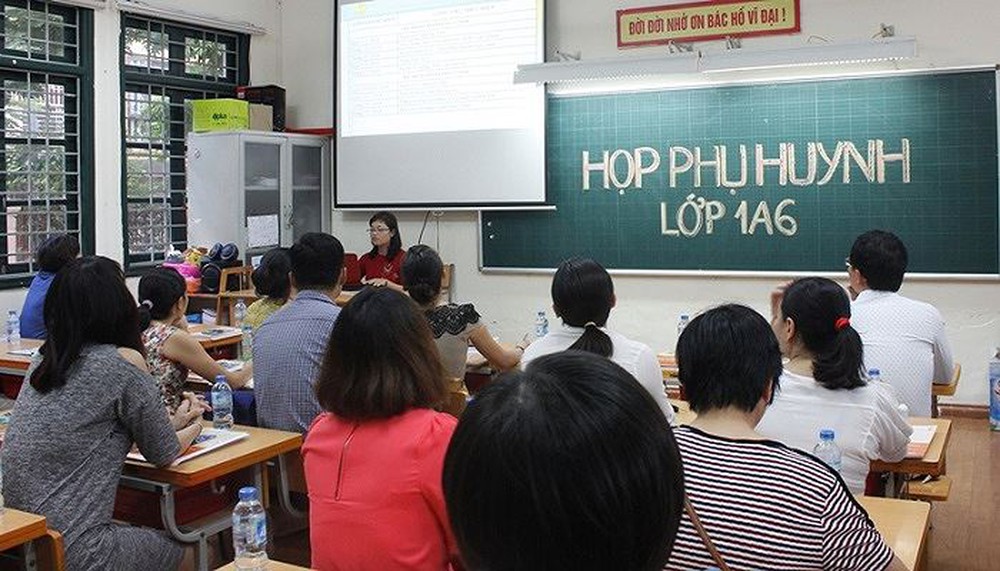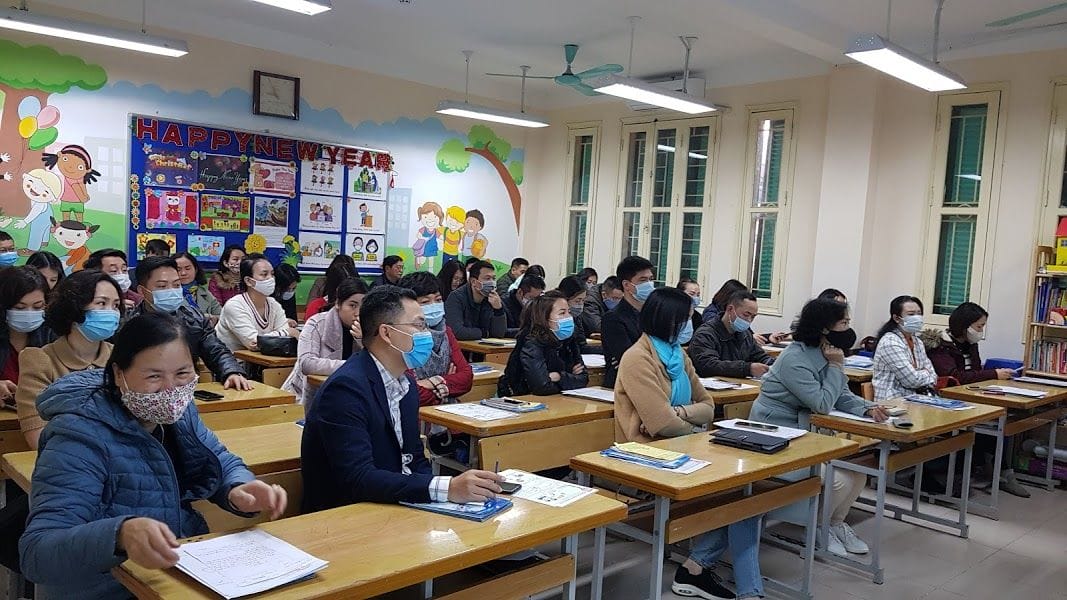A parent meeting is a form of activity organized by teachers with the participation of homeroom teachers, parents, and class leaders to discuss and help students solve academic and disciplinary issues. All activities in the class are aimed at helping students study well.
2. How is a parent meeting organized?
The homeroom teacher needs to propose new organizational methods and improve the presentation content at the meeting:
- Send parent meeting invitations to homes: The invitation letter must be written clearly with the date, month, year, time, and concise content of the meeting, stating who will attend the parent meeting.
- Homeroom teachers assign class leaders to clean the classroom, arrange desks and chairs in a straight line, wipe the board, and clean the windows and doors.
- Clearly write the list of parents attending the meeting. When parents enter the classroom, the homeroom teacher asks them to write their names in the list and arrange the seating for parents according to the position of their children in the class.
- Clearly state the content of the presentation on academic, disciplinary, and extracurricular matters of the students. Point out the positive and negative aspects of each student.
- Consult parents’ opinions on the students’ academic and disciplinary situations.
- Coordinate with parents to provide gentle and strict methods, encourage students from poor backgrounds to overcome difficulties through financial support from teachers and parents. Encourage some weaker students to strive for good and excellent grades by offering incentives.
- The homeroom teacher suggests that parents pay more attention to their children’s learning and pay attention to the behavior of some individual students.
- The homeroom teacher should organize outings for parents and students to exchange, understand each other, and share experiences because some parents are too busy at home to pay attention, teach, or go on long trips.
- The homeroom teacher informs parents of the financial situation of the class and asks parents to contribute a small amount of money to the class fund to support the students’ learning and activities at school.
- Keep the contact numbers of parents so that teachers can easily communicate with them.

3. The process of organizing a parent meeting
I. Preparation for the parent meeting
– Invitations (Time, location, participants, content, purpose…)
– Service staff (cleaning, drinking water,…)
– Prepare meeting materials
II. Organize the parent meeting
– Steady organization
– Present the content of the meeting
– Assign someone to take minutes
– Declare the reason
– Roll call
– Conduct the meeting according to the prepared content
If it is the beginning of the new school year:
The homeroom teacher needs to disseminate the school’s and class’s regulations (directions, goals for the school year…)
Introduce the class leaders
Announce school and class activities to be carried out during the school year.
Highlight the outstanding characteristics of the students in the class
Collect contributions from parents (if any)
Elect the parent association president

If it is the end of the school year
Announce the academic results of the students, the major characteristics of the students for parents (strengths, weaknesses, excellent students, well-behaved students, special students… Individual meetings with parents and students may be conducted if necessary.)
Announce the expenses of the class and the parent association
Review the activities of the class and the parent association
Solicit feedback and suggestions from parents and students
III. Conclusion
– Summarize the main points of the meeting
– Review the minutes of the meeting through the minutes of the meeting.
During the parent meeting, parents usually have at least ten to twenty minutes to discuss with the teacher about their children.
In this short period of time, parents need to introduce themselves, establish a relationship, and then exchange about their children’s abilities, habits, current progress, and how to coordinate with the school.
4. Questions parents ask teachers during parent meetings
– Questions about the school’s curriculum and learning
What will my child learn this school year? This is a common question but it will let you know which materials will be covered in the school year and what parents need to prepare.
What changes are happening this year and how can I help support my child through these changes? The transition to computerized testing is still ongoing. You will want to know how your child has progressed academically in the past year, and their thinking ability.
Other changes such as the application of information technology in the classroom or at home, or increasing students’ self-learning abilities. Find out about these changes and ask your child’s teacher what you can do to support the teacher and your child in their learning process.

– Questions related to the class and school management
What do you expect from home? Make sure you know how much time your child should spend on homework each week. What should you do when your child has difficulties? Ask the teacher to find out the solutions to these issues, ensuring your child’s work is completed.
What is the best way to contact you? If you haven’t had the opportunity to meet the teacher before, this is the ideal time to start developing a relationship with your child’s teachers. Teachers are often very busy. Finding an appropriate method of communication will ensure that your messages are received and responded to.
How does the school use my child’s grades? The accuracy of scores in measuring whether the skills taught at the grade level are being mastered?
The most important thing parents need to know is how the scores will be used to help their child in the next school year? For example: Do test scores affect the teacher’s time spent on topics?
If you have any questions about your child’s scores in tests, this is the time to discuss them with the teacher to get them clarified. Teachers cannot change everything, but express your concerns to the school board or education authority.
What parents should know about preparing for exams? This question will let you know how the school prepares for your child and what parents can do at home to support their child’s learning. Teachers have various techniques for preparing students for exams to ensure that the exams accurately measure the grade-level skills that children have mastered.
The answer will likely include studying grade-level materials throughout the year and a short period of practice or simulation of the exam.

– Questions about your child at school
What does your child enjoy? This question can give parents more information about their child or discover what their child is truly interested in in the development process.
What does the teacher consider your child’s strengths? This is a positive question focusing on what your child is doing well and what aspects your child needs to improve. If the child has many strengths and no difficulties in school, this question will let parents know the teacher’s concern for the child’s learning in the classroom.
Have the teachers identified any weaknesses in your child? This open-ended question helps you find out about any areas your child may be struggling with.
Do the teachers keep track of your child’s scores from the previous year? It serves as a basis for assessing how well your child is preparing for this school year. Some teachers even have the analysis chart of students’ test scores by specific skills. You can discuss these scores with your child’s teacher to see if there are any gaps that need to be addressed for your child to make progress.
Is your child working effectively in class? If not, how have the teachers supported your child? This question will help you understand if your child is falling behind and what you can do about it. Falling behind can make a child feel unsuccessful and lack motivation.
Who are your child’s friends? How does your child demonstrate communication and social skills? Developing communication and social skills is an important part of maturity. These questions can give you an idea of how your child interacts with others or whether your child feels safe and comfortable at school.
Is my child completing assignments on time? Some students may easily keep track of their assignments while others struggle. Educational researcher John Taylor identified 13 steps that need to be completed when assigning homework to students. If your child is not completing assignments, find out which steps are challenging and can help your child succeed in school.
How does my child participate in class activities? This question can let you know the level of your child’s participation in school. This question can also let you know if your child is having difficulty with attention in class.

– Questions for parents of special needs children
Does the teacher have a specific plan for your child? This question ensures that your child’s teacher knows that your child is a special needs child. If at the beginning of the school year, the teacher can still review the details of your child’s individual plans from the previous school year.
How is the teacher supporting your child? This answer will provide you with more detailed information about your child’s learning experience. This can also be a good communication activity to improve how to support your child effectively.
Is there anything else the teacher would like to know about my child? You are an expert on your child. This question will give your child’s teacher an opportunity to clarify anything in the plan. The teacher may want some explanations or suggestions on how to communicate effectively with your child.
There may be many other questions that parents can ask teachers. Remember that we are in the same boat, working towards the same goal of the child’s progress. Any misunderstanding or disruption in communication between teachers and parents will affect the child’s learning outcomes.
Be sure to bring a pen and notebook to take notes of important answers. If you think of any new questions, remember to discuss them with the teacher to keep both teachers and parents aware of your child’s success.



































